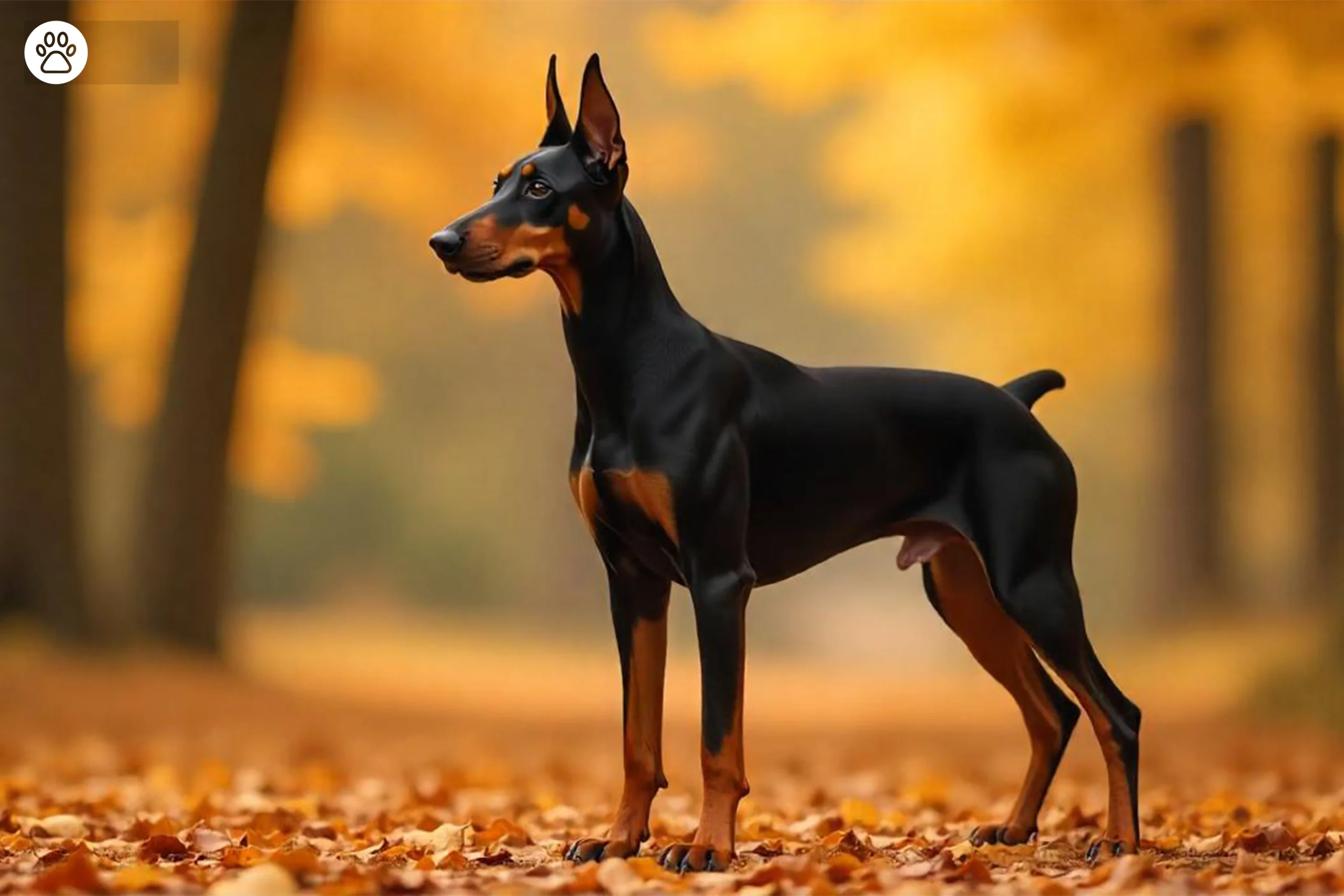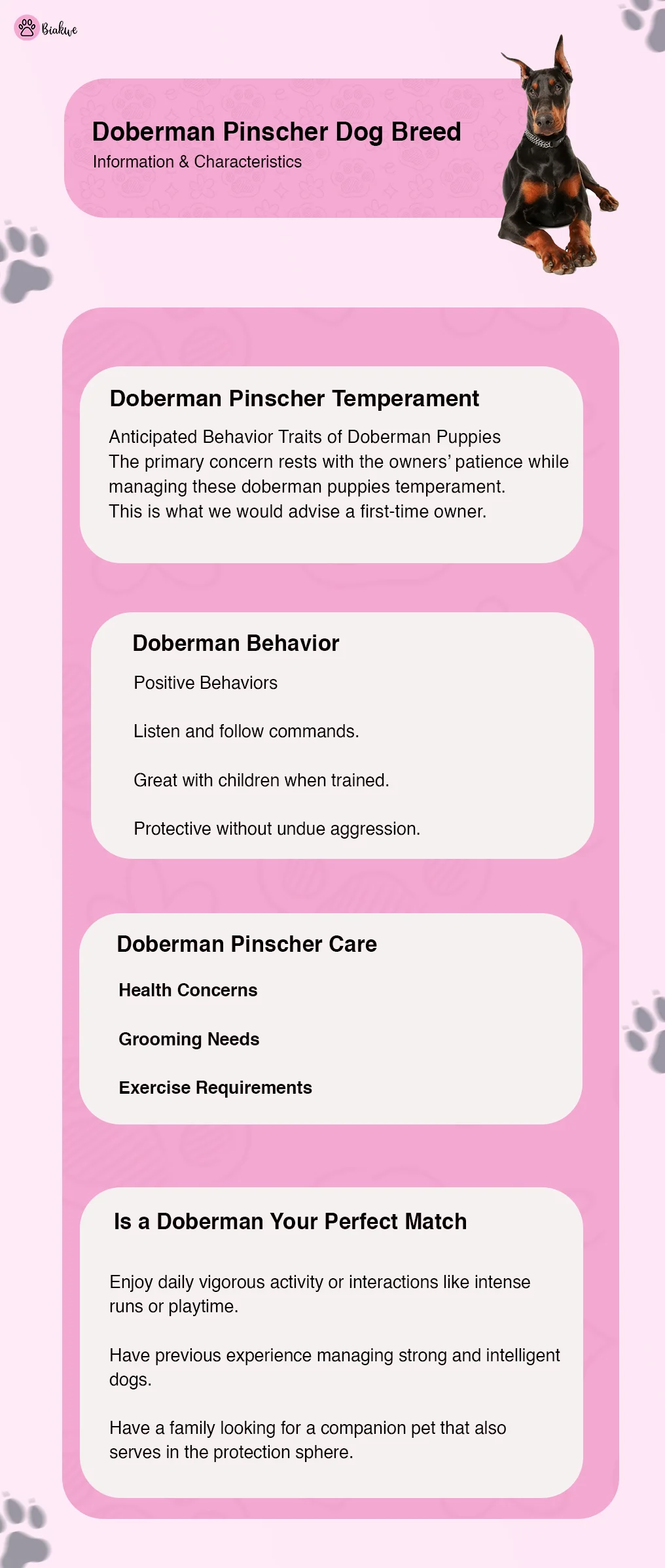The Doberman is known to be one of the most intelligent, actively energetic, and loyal dogs. Unlike other breeds, Dobermans are specially trained for protection, companionship and even multitasking. These dogs were bred in Germany by Karl Friedrich in the late 19th century. Dobermans are known to be celebratory companions as well as brilliant guard dogs.
What You’ll Find In This Guide:
This guide consists of everything you need to know about Doberman pinscher’s history along with its Doberman brown coloring, its varieties, its behavior and care, and all the other frequently asked questions. You will learn all about what sets the Doberman unique both on the inside and out.
Doberman Pinscher Overview
Let’s cover the basics before diving into specifics. This section talks about their origin, physical traits, and primary working dog functions.
History & Origin
These dogs were developed in Germany in the 1890s by tax collector Louis Dobermann for protection. He used Rottweilers, Greyhounds and German Pinschers as the foundation breeds.
Physical Characteristics
- Height: 24–28 inches (assumed males are taller than female)
- Weight: 60-100 lbs (lean, muscular frame),
- Coat Colors: Black, brown Doberman, blue and fawn, and Doberman pinscher red.
Did You Know: Originally cropped ears and docked tails were to prevent injuries while fighting.

Discover the bold and loyal Doberman Pinscher, a breed that thrives on protection and companionship. If you’re intrigued by unique dog personalities, explore the Chiweenie, a spirited Chihuahua-Dachshund mix. This pint-sized pup packs a big attitude, making it a fascinating contrast to the Doberman’s commanding presence. Learn how these breeds suit different lifestyles!
Doberman Pinscher Temperament: Loyal or Aggressive?
The Doberman pinscher personality often gets wrongly judged, and so let’s set the record straight on what to expect:
Key Traits
- Formidably Loyal: Deeply bonds with family.
- Exceptionally Smart: 5th ranked in canine IQ (Stanley Coren study).
- Energetic: Daily exercise is a must.
- Alert & Protective: Aggressive only to threats. Natural guarding instincts.
Debunking Myths
- Myth: Dobermans are very vicious animals.
- Truth: Gentle giants that require proper socialization.
“An untrained Doberman is a velvet-covered sword—powerful yet sharp.”

Anticipated Behavior Traits of Doberman Puppies
The primary concern rests with the owners’ patience while managing these Doberman puppies temperament. This is what we would advise a first-time owner.
Behavior Development Stages
- 8-12 Weeks: Boisterous yet requires direction. Need some structure. Explorational and playful.
- 4-6 Months: Chewing and barking. Boundary testing.
- 1 Year+: Active but pretty settled.
Recommended Training
- Work on obedience training from a young age.
- Incorporate other dogs and people.
- Positive feedback works best (mommy bosses are highly frowned upon).
The Doberman Pinscher’s sleek elegance and sharp intelligence make it a standout breed. For pet lovers curious about equally striking companions, dive into the world of Siamese cats. Known for their vocal charm and slender grace, Siamese cats share the Doberman’s knack for forming deep bonds. Explore their unique traits today!
Doberman Behavior: Common Traits & Challenges
Knowing Doberman behavior can help alleviate problems. Doberman breed temperament involves the following:
Positive Behaviors
- Listen and follow commands.
- Great with children when trained.
- Protective without undue aggression.
Potential Challenges
- Suffering from anxiety (does not like being alone).
- Aggressive tendencies (might chase smaller biters).
- Strong willed (needs assertive guidance).
Pro tip: Dobermans remain focused through mental stimulation such as puzzles.

Doberman Pinscher Care: Keeping Your Dog Happy and Healthy.
For Dobermans, their unique health concerns, grooming, exercise, and veterinary services form the basis of optimal care. Like all athletic dogs, they do thrive and require care, but are relatively low maintenance when compared to their long-haired counterparts.
Health Concerns
Of particular concern are the additional health issues which require supervision in almost half of all diagnosed cases of Doberman Pinscher born. DCM and annual heart check ups around the age of five together with OFA certified hip x ray screening tests at two also are necessitated due to smaller size forming predispositions towards hip dysplasia.
Additionally, the breed’s deep chest propensity causes various bloat risks. Starving and offering smaller portions during exercising windows is essential instead of single larger portions offered a few hours after meals.
Grooming Needs
Bandage under moderate control while showing obedient resistance to their heavily shedding coat. Monthly trimming to prevent cracking or breaking nails are in addition to the previously mentioned dental health hygiene. With Dobermans especially, brushing teeth 2-3 times per week is crucial to prevent periodontal disease.
Exercise Requirements
Exercise isn’t optional—it’s medicine. Those active dogs need over 60 minutes of physical activity every day. Some workouts include:
- Running (they are great jogging partners).
- Agility training (this helps to stimulate their sharp minds).
- Obedience drills (these drills provide the mental challenges eager to be consumed).
“A tired Doberman is a well-behaved Doberman—their energy must go somewhere efficient.”
Is a Doberman Your Perfect Match
Dobermans may be fit for you if:
- Enjoy daily vigorous activity or interactions like intense runs or playtime.
- Have previous experience managing strong and intelligent dogs.
- Have a family looking for a companion pet that also serves in the protection sphere.
Do mean remarks about you:
- Exercise is low and done infrequently – these dogs need a lot of activities.
- A solo Doberman in the family unless trained by a professional prior to acquisition.
- Does not provide the necessary time for engagement devoid home – that is.
“Your family does not naturally include a Doberman, but the moment you get one, they omit how much of life stays dedicated to you – unreasonable amounts.”
If you fulfill requirements outlined above, you’d expect to receive a dog unmatched in loyalty.
Conclusion
The Doberman Pinscher is both a fierce protector and a family friend, defying stereotypes. Beneath the solid build and alert demeanor is a sensitive gentle soul who forms deep connections with its people. Unlike other dogs, Dobermans do not wait to be commanded; they willingly adapt to your lifestyle.
Being a Doberman comes with many responsibilities. Their stout and muscular bodies help protect humans from intruders. But spoiled Dobermans have a soft and playful side that can be seen when they are at home. A Doberman with good social skills is guaranteed to be both violent and caring. Whether as a protective shadow, or as a loyal pet, a Doberman will always serve you.
“A Doberman is not simply a dog that is purchased, but rather is meant to be ‘experienced’. Their unparalleled loyalty is not something so easily given out. It is granted only when there is respect.”
